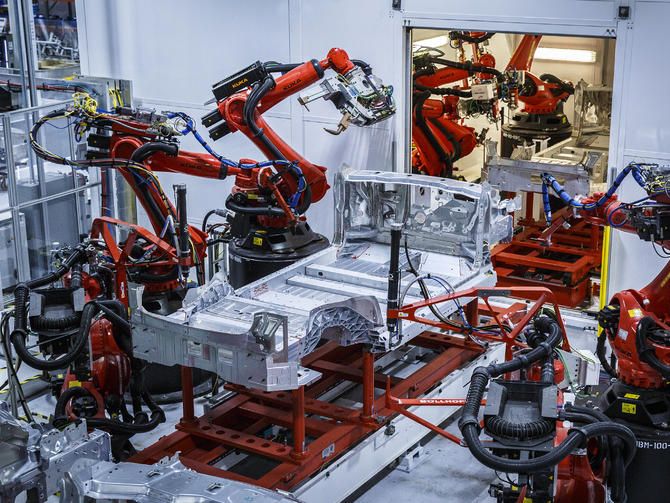AI-Powered Innovation in Tesla's Manufacturing Process

Tesla has emerged as a leader in the automotive industry, not only for its innovative electric vehicles but also for its cutting-edge approach to manufacturing. At the heart of Tesla's manufacturing success lies its extensive use of artificial intelligence (AI) and automation.
Tesla's factories are highly automated, with robots handling many of the tasks traditionally performed by humans. These robots are equipped with advanced AI algorithms that enable them to perform tasks with precision and speed. AI also plays a crucial role in optimizing the manufacturing process, from predicting equipment failures to managing inventory and logistics.
Specific Examples of AI Implementation in Tesla's Manufacturing
Tesla Bot: Tesla is developing a humanoid robot called Tesla Bot, designed to perform tasks that are unsafe, repetitive, or boring for humans. The Tesla Bot is expected to play a significant role in Tesla's factories in the future, further increasing the level of automation.
Predictive Maintenance: Tesla uses AI to predict equipment failures, allowing the company to proactively schedule maintenance and prevent costly downtime.
Inventory Management: AI algorithms optimize inventory levels, ensuring that the right parts are available when needed while minimizing storage costs.
Quality Control: AI-powered vision systems inspect vehicles for defects, ensuring that only the highest quality products leave the factory.
Energy Management: Tesla uses AI to optimize energy consumption in its factories, reducing costs and minimizing environmental impact.
The Impact of AI on Tesla's Manufacturing
Tesla's use of AI has had a significant impact on the company's manufacturing process, resulting in increased efficiency, reduced costs, and improved product quality. The company has been able to ramp up production quickly and meet the growing demand for its vehicles.
The Future of AI in Tesla's Manufacturing
Tesla continues to invest heavily in AI and automation, and the company is expected to play a leading role in the development of future manufacturing technologies. As AI capabilities continue to advance, Tesla will be able to further optimize its manufacturing processes, leading to even greater efficiency and productivity.
In addition to the examples mentioned above, Tesla also uses AI in other areas of its business, such as autonomous driving and energy storage. The company's commitment to AI is evident in its investments in research and development, as well as its acquisition of AI-related companies.
Tesla's success in leveraging AI in its manufacturing process serves as a model for other companies in the automotive industry and beyond. As AI continues to evolve, we can expect to see even more innovative applications of this technology in the manufacturing sector.
